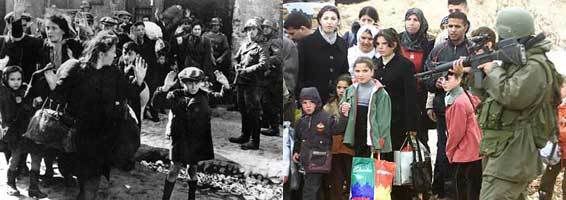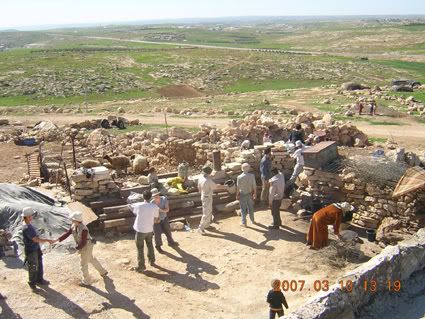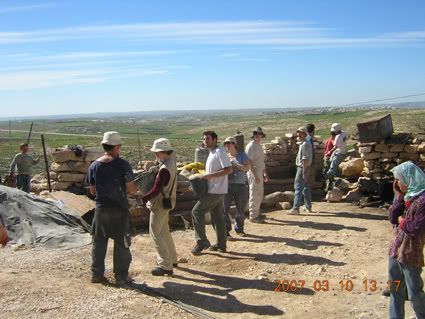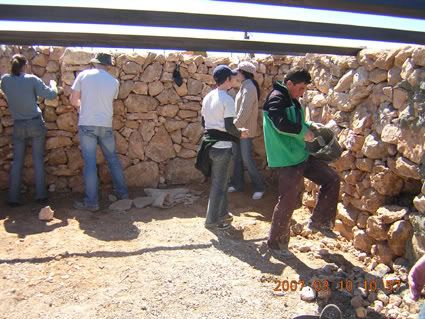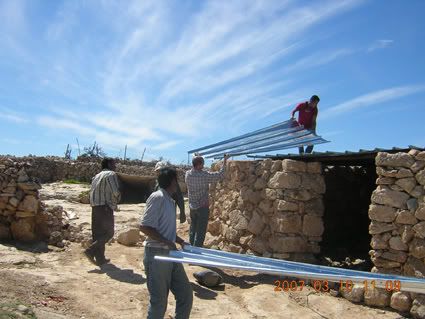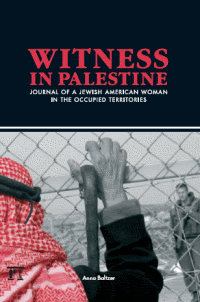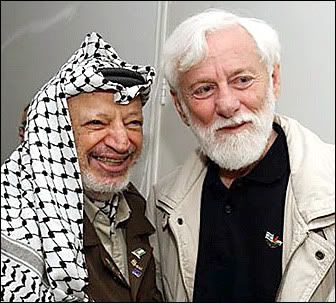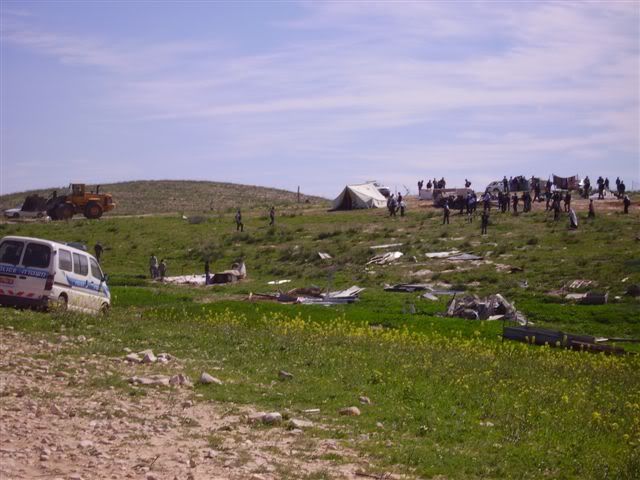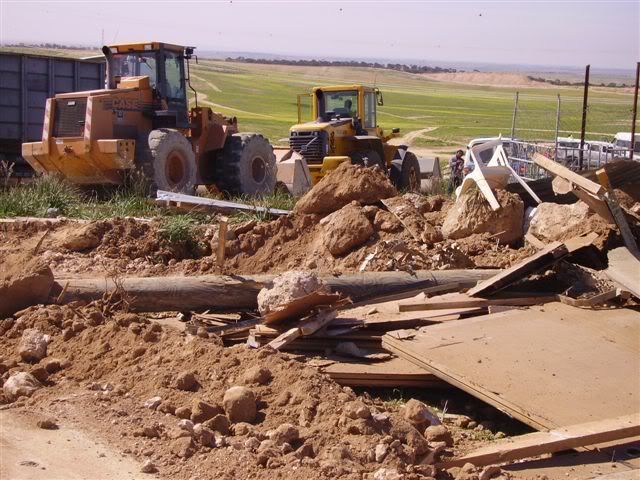At the author’s request, the title of the article presented below, The Gestapo and Wehrmacht of Our Time, was retained. The author is Khalid Amayreh. It was written for The People’s Voice and is based on the remarks of a German Catholic Bishop, who visited Israel and the Occupied Palestinian Territories on March 5th of this year. He compared Israel’s oppression of Palestinians in the West Bank with Nazi oppression of Jews at Ghetto Warsaw. (The photo above shows the Warsaw ghetto left, and the “Ramallah ghetto” right.)
Khalid Amayreh’s article takes the Bishop’s remarks further by giving them additional substance.
The Gestapo and Wehrmacht of Our Time
I fear very much that the Jews are like all underdogs. When they get on the top they are just as intolerant and cruel as the people were to them when they were underneath. I regret this situation very much because my sympathy has always been on their side.
Harry TrumanWhen a conscientious German Catholic Bishop visiting Israel and the Occupied Territories on 5 March compared Israel’s oppression of Palestinians with Nazi oppression of Jews at Ghetto Warsaw, Israeli apologists got furious.
Gregor Maria Franz Hanke of Eichstatt couldn’t suppress his rectitude and human decency when he was brought face to face with the affronting ugliness of the “separation wall” which has already morphed Palestinian population centers into modern-day concentration camps.
Upon seeing the misshapen creature, which is as ugly and as deformed as the Nazi-like mentality that gave birth to it, the German bishop said the following:
“This morning we saw pictures of the Warsaw ghetto at Yad Vashem and this evening we are going to the Ramallah ghetto.”
Unfortunately, we don’t have many religious leaders, let alone politicians, who are willing to call the spade a spade, especially when it happens to be in Jewish hands.
But this man said it as it is, preferring to be at ease with his conscience at the expense of standing accused and vilified by the holocaust cult.
There are many reasons and motives for western flaccidity toward Israel and Zionism. Some westerners believe that the holocaust, which was perpetrated by Europeans, should justify anything and everything Israel does to the Palestinians, including crimes against humanity and ethnic cleansing.
Many other westerners, especially North Americans, are simply scandalously ignorant of the Nazi-like nature of the Israeli state. Others know the facts very well, but are too cowardly and dishonest to speak up for fear of Zionist intimidation and retaliation. Others are simply malicious and believe that Israel, by virtue of being powerful militarily, has the right to pursue Nazi-like policies in order to serve its goals and interests. This is the same folk who would have embraced the Third Reich soul and heart because power is their God and “realism” is their religion.
I believe that people like the honorable bishop and all other free-minded voices that speak up in defense of truth, that don’t flinch from calling the spade a spade and refuse to cringe or cower in the face of evil, are the salt of mother earth and the crème de le crème of humanity. It these sporadic candles of light that keeps our world from plunging into moral nihilism.
Hence, we must salute them for their courage and morality and never allow ourselves to betray them or let them down. We must seek to emulate them in their courage and honesty and moral defiance in the face of evil, because in the final analysis life itself is a moral stand and is too short to be squandered and exhausted in the zigzags of political correctness. The Quran states:
“By the passage of time, man is indeed in a state of loss, except for those who believe, and do good deeds, and counsel each other to truth and counsel each other to patience.”
Of course, the bishop of Eichstatt is not inventing anything. He simply saw this diabolical, gigantic structure meandering around Palestinian population centers all over the West Bank, from Jenin in the north to Dahiriya in the south, cutting of neighbor from neighbor, and creating ghettos congested with poverty, misery, hunger and oppression.
In fact, had the bishop gone a little deeper and a little further, the overwhelming ugliness of Israel’s shame would have shocked him even further. I am saying this because Israel has not stopped at merely converting Palestinian towns and villages into virtual detention camps, but went many steps further by making sure that the tormented souls in these ghettos are constantly and relentlessly hounded and surrounded.
Indeed, not a day passes these days without the Israeli occupation army and the Gestapo-like Mishmar Gvul (Border Police) carrying out several raids into Palestinian towns and villages. During these criminal rape-like forays, innocent people are killed, injured and arrested, and their property is destroyed.
This writer witnessed an incursion at the village of al-Kum, 20 kilometers west of Hebron on Saturday, 10 March.
Around 2: a.m., numerous Israeli troops and paramilitary policemen stormed the small village (pop. 3000), placed it under curfew amid loud explosions of stun grenades meant to terrorize the people. Then the forces spread all over the village, vandalizing property and smashing glass and turning furniture upside down. After that, the mostly undisciplined soldiers used an elderly man, in his early 70s, as a human shield. Then they raided the local mosque, arrested three young men in their early mid 20s and left seven hours later.
Around the same time, a Palestinian driver, who reportedly transferred Palestinian laborers into East Jerusalem was beaten to death by the grandchildren of the Holocaust. According to eyewitnesses, Israeli Border Policemen ganged up on the man, identified as 32-year-old Wael Yousef Karawi, beat him on the head with the butts of their rifles, causing him a massive brain hemorrhage. The man collapsed and died on the spot. Then a few hours later a mendacious statement coming out of the Israeli mill of lie claimed that the man died of “natural causes.”
A day earlier, another poor Palestinian worker was killed in Gaza as he sought to enter Israel to find work. Israel has been starving Palestinians en mass by preventing them from accessing work and food. This manifestly criminal policy is carried out by barring Palestinians from fishing off the Gaza shore “for security reasons.” Today, as I write this piece, an Israeli naval patrol opened fire on two fishermen, injuring them both. More to the point, Gazans are not allowed to travel abroad for work or even medical treatment, because the so-called “border terminal” between Gaza and Egypt (Gaza’s only exit to the outside world) is kept closed by Israel nearly all the time for no reason other than tormenting an already thoroughly tormented people.
None the less, Israel still has the audacity to tell the world that it has ended its occupation of Gaza. You see God’s lying people.
Two weeks ago, the Israeli occupation army murdered two people in Nablus, including a young boy who hurled a stone toward (not on or at but toward) an Israeli Armored Personnel Carrier (APC) rampaging through the streets of the city. The other man was shot dead as he stood at his rooftop to fix a TV antenna. Responding to charges of cold-blooded murder, an Israeli army spokesperson said rather tersely that the “incident is being investigated.”
Of course, this is a lie, nothing is being investigated, and even if there was an investigation, it would blame the victims and declare the killers `innocent of any wrong doing” because they acted in accordance with outstanding army instructions.!!!! Well, even the Gestapo and SS were also acting in accordance with outstanding army instructions.
In the meantime, the Israeli state keeps swelling its dungeons and detention camps with young Palestinians. The declared reason is “security,” but the real reason is to keep as many Palestinians as possible behind bars in order to use them as bargaining chips in any prospective negotiations with the inherently weak Palestinian Authority.
According to both Israeli and Palestinian sources, the Israeli army rounds up an average of 15-20 Palestinians per days. Now the number of Palestinian detainees and internees in Israeli jails and detention camps stands at 10,000-11,000.
On Friday, 9 March, an Israeli military court sentenced Hebron MP Hatem Qafisha, to six months of “administrative detention,” without charge or trial. The six months are renewable depending on the mood of the Shin Beth officer in charge of the Hebron region. There are Palestinian detainees who have been languishing in Israeli dungeons for 80 or even 90 months without charge or trial. Usually, the mantra of security is always ready to be evoked in defense of the Nazi-like justice system.
In fact, Qafisha has already spent 93 months in Israeli jails first for “harboring extremist views” and second for “competing in legislative elections under the banner of a terrorist organization,” a clear allusion to Hamas.
Well, didn’t Israel and the United States consent to the participation of Hamas in the elections, which took place in 2006? If so, why arrest these people, including democratically-elected lawmakers, cabinet ministers, and even the Speaker of the Palestinian Legislative Council Aziz Dweik, and dump them in detention camps for lengthy terms? If they have committed any crime, let them be tried before a genuine court of law, not before the court of the occupation for which a Palestinian is guilty even if proven innocent…just as the Nazi courts viewed Jews as guilty even proven innocent.
Are the Zionists the Nazis of our time? Is the Israeli army and police the Wehrmacht and Gestapo of our time? This is a question for Jews to answer. Maybe they will come to the realization that this sick and sickening state is corroding their humanity. Just maybe.
I introduced Khalid Amayreh’s article with the idea that the Nazi analogy to Israel’s behavior toward the Palestinians is the most hated comparison of all. Essays and diaries appearing on blogs that propose such an analogy are greeted fast and furiously with condemnation of the author, who is immediately overwhelmed with charges of anti-Semitism, and every measure taken to disturb discussion of just how it might be applicable, if it is. Mixed in with the condemnations one can also find charges against the Palestinians, that they send suicide bombers into Israeli pizzerias to kill innocent Israeli civilians and engage in similar atrocities, while conveniently failing to mention the inciting causes of such acts.
However, let us suppose that the Bishop’s analogy is incorrect. Most Americans, who are really ignorant of the reality of life in the West Bank and Gaza, the true history of the conflict, and the real purpose of Israel’s 40 year military occupation of the Palestinian people, i.e., to confiscate their lands, would certainly not find that hard to believe. From what most Americans know (been told), Israel, the only democracy in the Middle East, is (portrayed as) the victim of Palestinian terrorism. “Terror, terror, terror,” was the way Ariel Sharon often put it, and what the Israeli propaganda machine, which now has the full complicity of the US State Department, keeps repeating.
But if the Nazi analogy is incorrect, by how much is it incorrect? Before any suicide bomber entered Israel during the second Intifada, Israel soldiers had killed many innocent Palestinians. Included among them were 27 innocent children, aged 4 months to seventeen, most of whom were shot in the head by live ammunition. What kind of people engage in or condone such behavior? As Khalid Amayreh addressed it, “This is a question for Jews to answer.” Actually, this is a question for Israelis to answer. Jews in organizations like Not In Our Name and Jewish Voice for Peace and dozens of other activist organizations in Israel, Palestine, the US, and around the world already seem to know the answer.
The above article originated on http://www.thepeoplesvoice.org – Permission is granted for reprint in print, email, blog, or web media if this credit, © By Khalid Amayreh for thepeoplesvoice.org, is attached and the title and text remain unchanged.
This version was reprinted with permission from: http://umkahlil.blogspot.com/2007_03_01_archive.html
